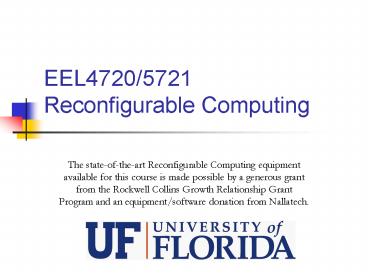EEL4720/5721 Reconfigurable Computing - PowerPoint PPT Presentation
Title:
EEL4720/5721 Reconfigurable Computing
Description:
EEL4720/5721 Reconfigurable Computing The state-of-the-art Reconfigurable Computing equipment available for this course is made possible by a generous grant from the ... – PowerPoint PPT presentation
Number of Views:80
Avg rating:3.0/5.0
Title: EEL4720/5721 Reconfigurable Computing
1
EEL4720/5721 Reconfigurable Computing
- The state-of-the-art Reconfigurable Computing
equipment available for this course is made
possible by a generous grant from the Rockwell
Collins Growth Relationship Grant Program and an
equipment/software donation from Nallatech.
2
Instructors
- Dr. Greg Stitt
- gstitt_at_ece.ufl.edu
- http//www.gstitt.ece.ufl.edu
- Office Hours Mon/Tue Period 4 (935)
- (Benton 323)
- Also, by appointment
- TA Everett (Aran) Salley
- esalley_at_ufl.edu
3
Course Website
- 2 sites
- http//www.gstitt.ece.ufl.edu/courses/eel4720_5721
/ - Linked off my website
- Includes all slides, labs, reading assignments,
announcements, etc. - Sakai
- http//lss.at.ufl.edu/
- Select Sakai
- Login with GatorLink account
- Used for posting grades, turning in projects,
student discussions - Email Policy
- When sending an email, include the class name in
brackets - e.g. EEL5721 Question about project 2
4
Grading
- Grading
- Mid-term 1 25 (Wed. October 9th)
- Mid-term 2 25 (Wed. December 4th)
- Labs/Homework 25
- Project 25
- Tests will be 50 minutes, during normal class
time - EDGE students have 3 day window for tests
- October 8th-10th and December 2th-4th
- Final grade curved average of all components
- 5721 may possibly have different tests, project,
or grading
5
Lab Assignments
- Linked off main website
- http//www.gstitt.ece.ufl.edu/courses/eel4720_5721
/labs/ - Intended to familiarize with FPGA boards, VHDL
- Initial labs will be individual
- Groups allowed when using boards
- There are 100 students in this class and 10
boards - Will announce group policies when discussing
corresponding labs
6
Research Project
- 2 options
- Assigned project
- Proposed project
- Assigned project
- Most of the class will do this project
- There will several alternatives for different
group sizes - EDGE students will have a project appropriate for
a individual participant - EDGE students can participate in groups if
desired - Important I will require a minimum number of
groups to deal with the few boards - Likely 3-4 per group
7
Research Project, Cont.
- Proposed project
- Topic subject to instructor approval
- Due to the limited number of boards, the proposed
project option must be earned - Will allow those with best grades or project
ideas to do their own project - Suggestion find algorithm in your area of
interest, use reconfigurable computing to improve
performance - Image processing, bioinformatics, physics,
chemistry, AI, etc. - If interested in research, email me later in the
semester - Will try to find a project that helps towards PhD
8
Reading Material
- No required textbook
- Optional books on website and in syllabus
- Research papers
- Check class website for material associated with
each lecture - Will also post slides when used
- Important VHDL resources posted on website
9
Prerequisites
- You should be familiar with basics of
- Digital design
- Registers, muxes, adders, finite-state machines,
etc. - Architecture
- ControllerDatapath
- Memories
- Pipelining
- Assumes no knowledge of reconfigurable computing
or VHDL
10
Goals
- Understanding of issues related to RC
(reconfigurable computing) - Architectures
- Tools
- Design methodologies
- Performance analysis
- Etc.
- Detailed investigation of a specific application
- Research project
- Publish!
- Outstanding projects will be submitted to
conferences
11
Academic Dishonesty
- Unless told otherwise, labs and homework
assignments must be done individually - All assignments will be checked for cheating
- Groups must obtain permission to use larger size
- May be allowed for difficult projects
- Collaboration is allowed (and encouraged), but
within limits - Can discuss problems, how to use tools etc.
- Cannot show code, solutions, etc.
- I will be using automatic cheat checking
- Cheating penalties
- First instance - 0 on corresponding assignment
- Second - 0 for entire class
12
Attendance Policy
- Attendance is optional, but highly recommended
- If you are not an EDGE student, please dont
disappear! - I answer a lot of questions before and after
lecture - I will not be pleased if you come to my office or
send me an email with the same questions - If you are sick, stay at home!
- If obviously sick, you will be asked to leave
- Missed tests can be retaken with doctors note
13
What is Reconfigurable Computing?
- Reconfigurable computing (RC) is the study of
architectures that can adapt (after fabrication)
to a specific application or application domain - Involves architecture, tools, CAD, design
automation, algorithms, languages, etc.
14
What is Reconfigurable Computing?
- Alternatively, RC is a way of implementing
circuits without fabricating a device - Essentially allows circuits to be implemented as
software - Circuits are no longer synonymous with hardware
- RC devices are programmable by downloading bits,
just like microprocessors - Difference is that microprocessor bits specify
instructions, whereas RC bits specify circuit
structures
Microprocessor Binaries
FPGA Binaries (Bitfile)
Bits loaded into logic blocks, switch matrices,
memories, etc.
Bits loaded into program memory
0010
0010
15
Why is RC important?
- Performance
- Often orders of magnitude faster than
microprocessors - Low power consumption
- A few RC devices can provide similar performance
as large cluster at a fraction of the power - Also smaller, cheaper, etc.
- Motivating example Novo-G
- FPGA-based supercomputer
- 192 large Altera Stratix III FPGAs
- 24 Linux nodes
- Speedups of 100,000x to 550,000x for computation
biology apps (compared to 2.4 GHz Opteron) - Performance similar to top supercomputers
- However, power consumption is only 8 kilowatts
compared to 2-7 megawatts
16
Reminder
- Lab 0 ISEVHDL Tutorial
- Read RC survey linked off website
- Start reading VHDL tutorial

